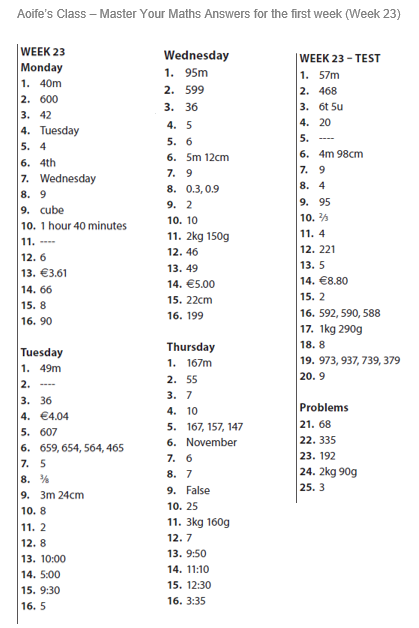School Work for Next 2 Weeks
Resources can be found and downloaded from the following Dropbox link:
Gaeilge
- Oral Language posters (see Dropbox - link above)
Maths
- Revision and development of times tables:
Time Tables Champion
- Learn and complete tasks for 7 times tables, look back and check-up
- Revise: 2, 3, 4, 5, 6, 7, 8, 9, 10 times tables
- Master your Maths:
- The next 2 weeks of Mental Maths - Monday to Thursday.
- The next 2 Friday tests at the back of the book.
- Revision and development of the four operations (+, -, x, ÷), money & time:
SESE
- Project work on: The Vikings
Here are some suggested links to help with your research:
- The students are to complete a 2 week project on the Vikings
Ideas for how to carry out the project:
Week One
- Research your topic and gather all the information you are going to use.
- Where will you find this information? Who will help you? There is a lot of information out there so …
- Think of your audience and ask yourself these questions-
1. What do I want the children/teacher to learn from my project?
2. What are the key words that they need to know at the end?
3. What will I start with, what will be my middle part and what will be my end part?
4. What are the keywords for these three parts?
Suggestions for how to organise your project:
Start with – The origin of the Vikings, the timeline of the Vikings, their daily life,
culture and religion and the food they ate.
Middle Part- Choose 3 or 4 topics to focus on: homes, work, leisure and pastimes,
clothing, weapons, food, religion etc. (you can choose your own topics, if you wish).
End Part-
The influence of the Vikings today in Ireland
Viking traditions and festivals.
Start with – The origin of the Vikings, the timeline of the Vikings, their daily life,
culture and religion and the food they ate.
Middle Part- Choose 3 or 4 topics to focus on: homes, work, leisure and pastimes,
clothing, weapons, food, religion etc. (you can choose your own topics, if you wish).
End Part-
The influence of the Vikings today in Ireland
Viking traditions and festivals.
Week Two
Break your work up into themes and summarise the information you have-get rid of any
information you do not need e.g. I have lots of information on the warriors so I will summarise i
t into the most important and interesting parts and focus on other areas that I may not have as
much information on
Think of your audience and summarise the information you have in your own words rather
than copying it from the source of the information. Putting the information into your own words
will help you to learn. Copying and pasting is not learning.
Think of:
1. How can I say this information in an interesting way?
2. What nice words /new words can I use?
3. How can I put the information into my own words?
4. Which pieces of information are the most important? What can I leave out?
Start writing/typing your work. It is a good idea to write in pencil first and then when you
correct your spellings/grammar write in pen.
Finish writing/typing your work. Make sure you have lines so your writing is neat and clear.
Check all spellings, edit and correct. Do not present work with incorrect spellings-get an
adult to check it for you.
Will you use images/pictures/maps/photos?
Will you decorate or draw to make it look more attractive to your audience?
Include the sources of information for your work at the end of your project.
Break your work up into themes and summarise the information you have-get rid of any
information you do not need e.g. I have lots of information on the warriors so I will summarise i
t into the most important and interesting parts and focus on other areas that I may not have as
much information on
Think of your audience and summarise the information you have in your own words rather
than copying it from the source of the information. Putting the information into your own words
will help you to learn. Copying and pasting is not learning.
Think of:
1. How can I say this information in an interesting way?
2. What nice words /new words can I use?
3. How can I put the information into my own words?
4. Which pieces of information are the most important? What can I leave out?
Start writing/typing your work. It is a good idea to write in pencil first and then when you
correct your spellings/grammar write in pen.
Finish writing/typing your work. Make sure you have lines so your writing is neat and clear.
Check all spellings, edit and correct. Do not present work with incorrect spellings-get an
adult to check it for you.
Will you use images/pictures/maps/photos?
Will you decorate or draw to make it look more attractive to your audience?
Include the sources of information for your work at the end of your project.
English
- Grammar sheets (paper copies sent home)
- Read your book
- http://www.pobble365.com/ Pobble 365… use images as inspiration for creative / free writing
- https://trte.rte.ie/news2day/ News2Day- keep up to date with
Learn Together / Mindfulness
- Downloaded from Dropbox:
Thanks,
Aoife & Becky!

